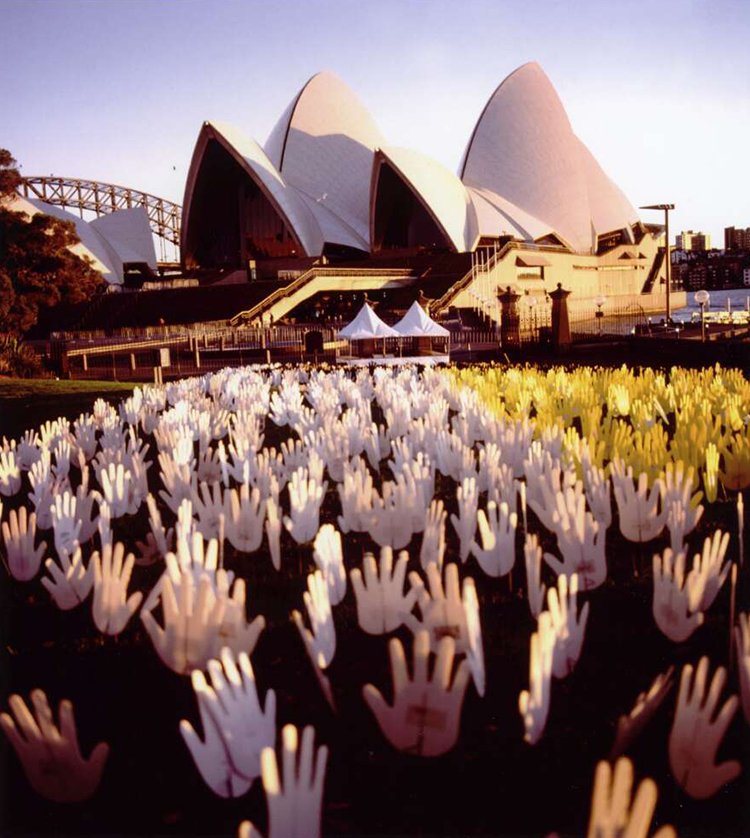2020 marks 20 years of Reconciliation Australia shaping Australia’s journey towards a more just, equitable and reconciled nation. In celebration of this year’s theme—In This Together—we asked staff of all backgrounds and cultures to tell us all about what Reconciliation means for them and their work.
Loui Seselja, Sea of Hands with the Sydney Opera House in the Background During Corroboree, 2000, nla.cat-vn846588
Rebecca Bateman, Indigenous Curator
What does Reconciliation Week mean to you and your communities?
As an Indigenous person, Reconciliation Week is incredibly important to me.
For me, my whole life is an act of reconciliation! I have Indigenous and non-Indigenous heritage and am constantly weaving together the various aspects of my identity and being. National Reconciliation Week is a time to share my world with others and to invite other Australians to learn about our shared history and heritage on a deeper level. The theme of NRW this year is ‘In This Together’ and, to me, that is really what Reconciliation Week is about—coming together, being together, learning together and growing together so that we can understand each other better and make a more inclusive and respectful future.
Ultimately, Reconciliation Week is an opportunity to remind everyone—myself included—how important this is and to create opportunities for reconciliation to happen.
Dr Shirleene Robinson, Senior Curator Oral History and Indigenous Programs
What does Reconciliation mean to you in the work that you do here at the NLA?
Reconciliation is deeply embedded in the work I do at the Library which has been centered around the Library's oral history and folklore collection. I have had the great privilege to work with the Library's Indigenous Curator, Rebecca Bateman, who works tirelessly each day on the continuing journey to make sure the Library and it's collections are accessible to First Nations people and that the history and culture of First Nations Australians is recorded in an accurate and culturally appropriate way.
I hope that in my role at the Library, I am able to work closely and collaboratively with First Nations Australians to elevate their voices, ensure that critical histories are recognised and recorded and that the Library recognises the deep, ongoing connection that First Nations Australians have with this continent. I hope that oral histories can play a strong role in privileging the voices of First Nations Australians and recording histories that have been marginalised for too long. Truth-telling and a shared understanding are critical to a process of reconciliation and healing. I hope that the Library's collections—including its oral history and folklore collection—can play a strong role in conveying this message. I am proud that the Library holds collections such as the Bringing them Home oral history project, which records deeply moving and critically important histories of the stolen generations. The values of truthfulness, trust, respect and recognition alongside collaborative collecting are integral to the work I do at the Library. To me, reconciliation also means recognising that there is much more to be done and that everyone must play a part in this ongoing journey.
Rochelle Armstrong, Collections Officer
How does your work here at NLA help contribute to a more unified Australia?
I work in the Australian Monographs Team where we catalogue new items for the library—meaning, we describe them to make them easy for people to find and use. I would say that the biggest thing we do to help reach remote communities and contribute to a more unified Australia is our ongoing work to make our catalogue more inclusive, helpful and culturally safe. So, for example, we now use Austlang to name Australian language groups in our records instead of grouping items of all Australian languages under one umbrella heading—which is what happened in the past. We also use AIASTIS pathways to find subject headings to ensure that the language used is appropriate. We put warnings onto records when needed—for example to warn for distressing content. Basically, we try and make the catalogue easy to use for people so that they can access our collections more confidently.
Olivia, 2020 NLA Grad
What is your hope for Reconciliation in the future?
I believe in strength and stoicism, not hope. It was hard but we have been stoic for decades in the face of great adversity. Through determination and strength, we are reclaiming, learning and asserting our languages, culture and identity. We have had wins; from Mum Shirl's activism and the global success of Albert Namatjira, to Cathy Freeman celebrating her win with both the Aboriginal and Australian flag, and Linda Burney becoming the first Aboriginal woman in the House of Reps. These things have been important for all of Australia and through looking back, I also look forward to a richer Australia.
